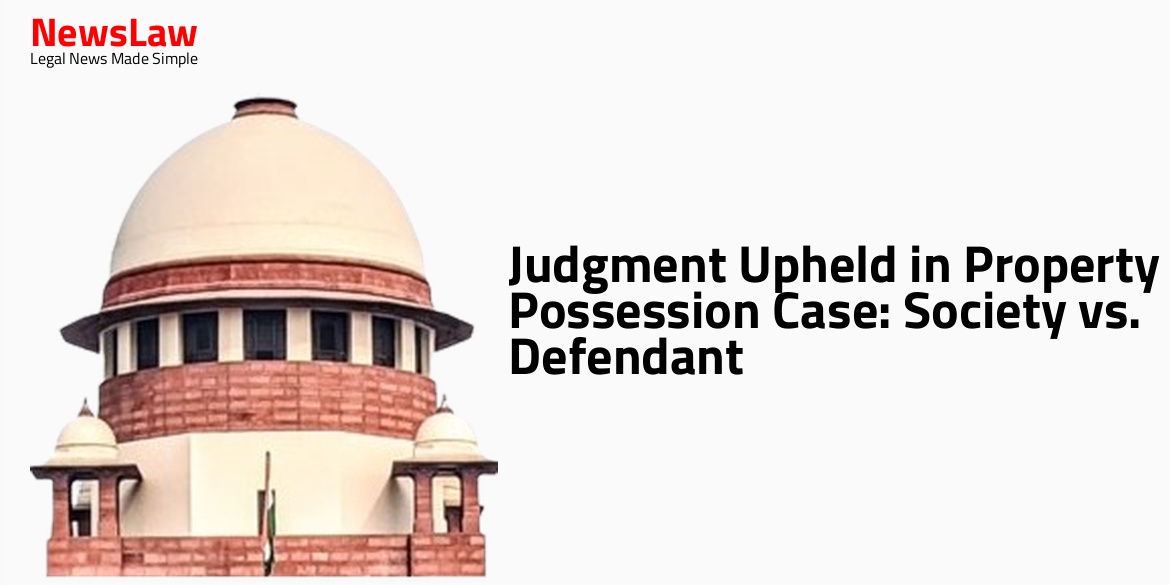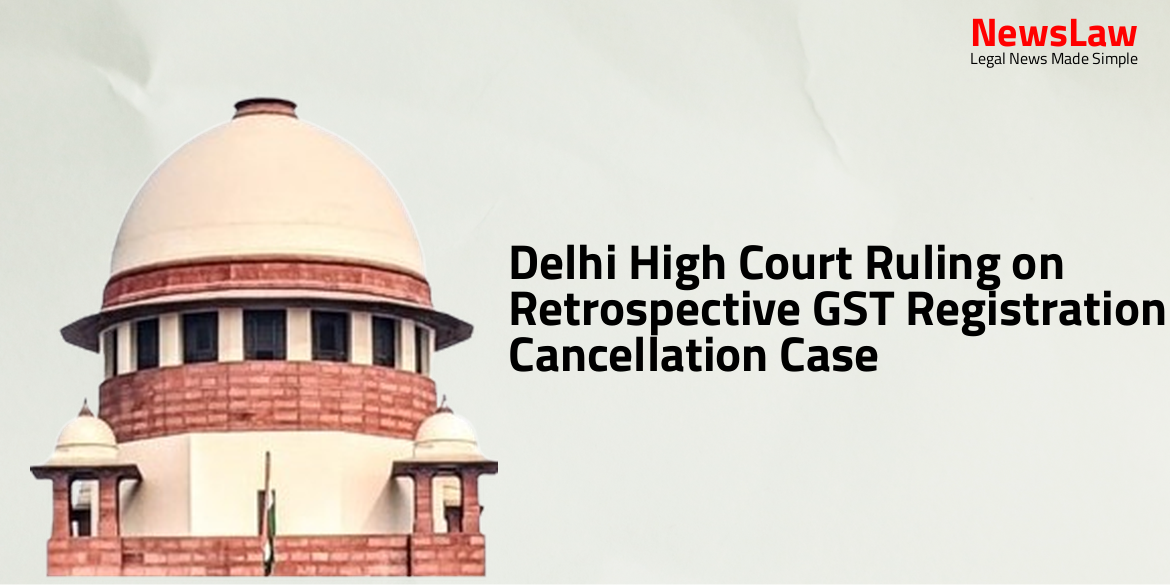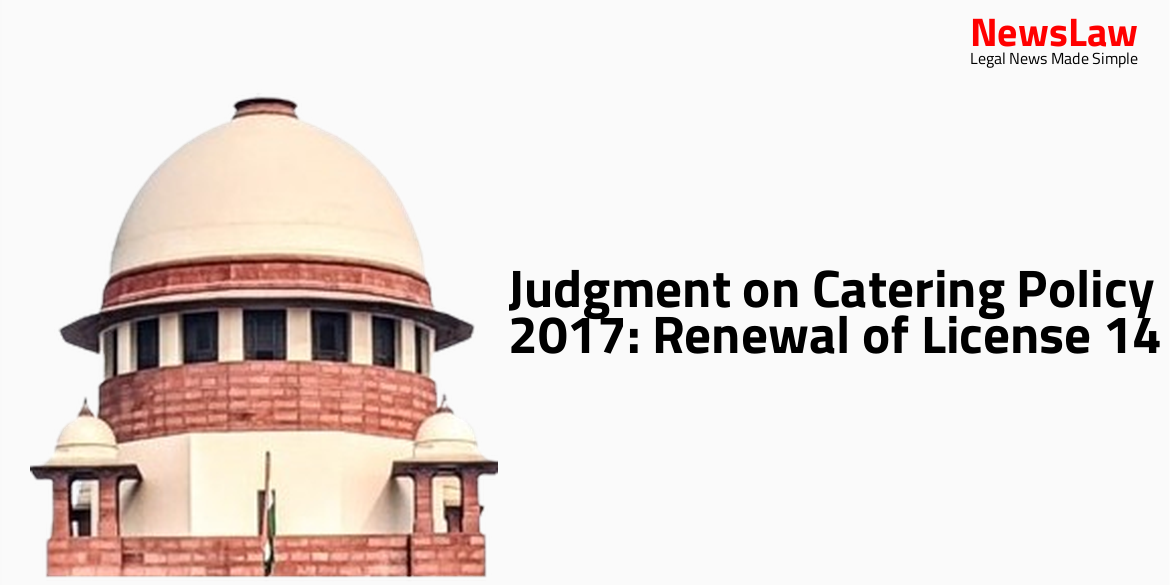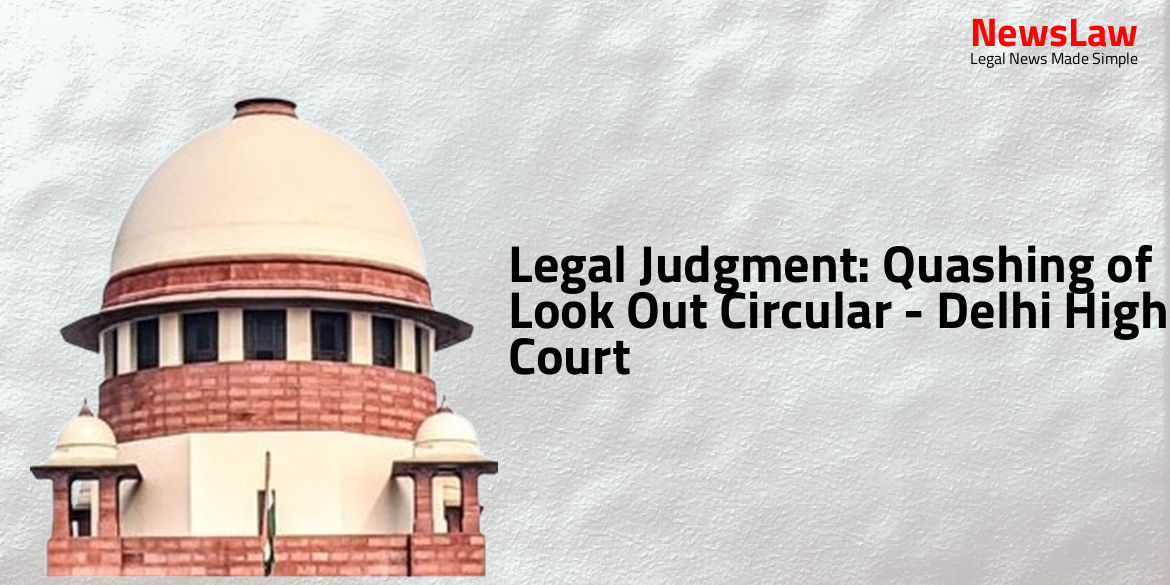In a recent legal proceeding in the Delhi High Court, a judgment was upheld in a property possession case involving a Society and the Defendant. The lower court’s decision in favor of the Defendant was maintained, and the appeal was dismissed. The case revolved around issues of ownership rights, rent agreements, and termination notices concerning the suit property. The judgment analyzed the admissions made by the parties and the validity of the rent agreement. Let’s delve into the details of this significant legal case.
Facts
- Appellants served a legal notice to the respondent stating payment of token money and subsequent payments for the purchase of the property.
- Defendant no. 1 and 2 received the legal notice on 03.03.2020.
- The application was allowed and the impugned judgment was passed in favor of the respondent.
- Appellants filed the instant regular first appeal RFA 558/2022.
- No clear admission found in the written statement or documents filed by either party.
- Counsel for the respondent argued that the petition lacks merit and should be dismissed.
- Appellant no. 1 is a society formed for admissions on behalf of the appellants.
Issue
- The issue before the court is regarding the correctness of the lower court’s interpretation of the law in granting the possession decree to the respondents.
- The key question is whether the lower court’s decision was in accordance with the applicable legal principles.
- The judgment will focus on analyzing whether the lower court correctly applied the law in reaching its decision in favor of the respondents.
Arguments
- The appellant’s counsel argues that the presumption of service by registered post is rebuttable as per Section 270f of the General Clauses Act, 1897.
- It is contended that the respondent did not establish ownership rights over the property as no supporting documents were presented.
- The judgment in favor of the respondent was based on an alleged admission in the written statement, which the appellants claim was made for obtaining permissions rather than indicating ownership.
- The appellants assert that a significant amount was already paid to the respondent, with the remaining to be paid after the sale deed execution.
- The appellants were not provided an opportunity to defend themselves, which is deemed a violation of natural justice.
- The notice of termination of the rent agreement was disputed as invalid due to laws under the Transfer of Property Act, 1882.
- It is argued that the respondent’s claims in the plaint were vague, ambiguous, unspecific, and frivolous.
- It is contended that the judgment solely based on the admissions of a tenant-landlord relationship is against legal principles.
- The petition requests that the judgment be reconsidered and appropriate reliefs granted.
- Respondent argued that the impugned judgment was based on admissions of a rent agreement between the parties, establishing lawful possession of the suit property.
- Admissions, including those relating to TDS certificates, are considered valid even if not part of the pleadings.
- The appeal was filed against the decree passed by the Civil Court on questions of law.
- The appellants claimed the alleged admission was disputed and not unequivocal, hence not legally binding.
- The judgment required fulfillment of certain criteria for possession in a suit for recovery, including the existence of a landlord-tenant relationship.
- The defendants admitted the execution of a rent agreement in their reply and written statement.
- The appellants argued the rent agreement was invalid as it was for five years and not properly registered.
- The appellants claimed the agreement was only for the purpose of running a school and fulfilling affiliation requirements.
- The respondent countered the appellants’ claims with evidence of TDS certificates and IT returns.
- The respondent emphasized that the rent agreement had ended, and the appellants were required to vacate the property.
- The respondent highlighted that the TDS certificates proved the tenant-landlord relationship between the parties.
Analysis
- The Court examined paragraphs 4 & 5 of the written statement and reply to Rule 6 of the CPC.
- The appellants alleged that the rent agreement was not valid as it was not registered and merely notarized.
- The appellants admitted the existence of the rent agreement, leading to the conclusion of a tenant-landlord relationship.
- The Court emphasized the importance of clear and unambiguous admissions to be considered in judgments.
- The validity of the rent agreement was questioned by the appellants, but corroborating evidence established a tenant-landlord relationship.
- Section 96 of the CPC allows for filing a Regular First Appeal against the original decree.
- The Court exercised judicial discretion considering the implications of a judgment on admission.
- The judgment was based on the admissions made by the appellants regarding the rent agreement.
- The Court referenced the principles from Balraj Taneja & Anr Vs. Sunil Madan & Anr.
- The Court highlighted that unequivocal admissions can lead to a judgment without a trial.
- The Court found that unclear and ambiguous admissions cannot be considered without accounting for objections.
- The alleged rent agreement was deemed invalid due to lack of registration per the Registration Act.
- A clear admission was found essential for a judgment on admission to be rendered by the Court.
- The Court examined material to render the judgment in favor of the respondent based on the admissions.
- The Court discussed the legal implications and conditions for a judgment on admission.
- The Court clarified the nature of admissions and their significance in legal proceedings.
- Courts have the power to pass a judgment based on admissions made by parties at any stage of the proceedings.
- Admissions can be made orally or in writing, in the pleading or otherwise.
- The judgment on admission under CPC governs judgments on admission.
- In the case of Jeevan Diesels & Electricals Ltd. v. Jasbir Singh Chadha, the scope of passing judgment on admission was discussed by the Hon‟ble Supreme Court.
- The judgment on admission allows the Court to make a decision based on admissions made by the parties.
- Admission should be categorical and used only when there is a clear ‘admission’ that can be acted upon.
- Discretion of the Court should not be exercised to deny the right of a defendant to contest the claim unless the admission is clear, unambiguous, and unconditional.
- For an admission to be valid, it must be unequivocal, unambiguous, and unconditional.
- The purpose of Rule is to enable parties to obtain a speedy judgment.
- Filing an eviction suit under general law serves as a notice to quit on the tenant.
- Notice dispatched by registered post is presumed to be served under Section 27 of the General Clauses Act.
- Admissions made by parties to interrogatories should be clear and unambiguous for them to be valid.
- Judgment can be given on an ‘admission’ contained in the minutes of a meeting if it is clear and unequivocal.
- Court should exercise judicial discretion based on examination of facts and circumstances of the case.
- Admission should be a conscious and deliberate act showing intention to be bound by it.
- The appellants raised objections which were duly considered by the lower court.
- The written statement and reply by the appellants indicated clear admission of facts.
- Claims regarding the sale of the property were considered as an afterthought.
- Rent agreement was found to be in line with the agreements between the parties.
- The lower court correctly considered the propositions put forth by the plaintiff.
- No grounds were found for the appellate jurisdiction to interfere with the lower court’s conclusion.
- The lower court’s decision based on the appellants’ admission in the written statement was upheld.
Decision
- The instant appeal has been dismissed.
- The arguments of the appellants have been deemed to lack force.
- The impugned judgment dated 14 July, 2022 passed by the learned ADJ-05, South-West District, Dwarka Court, New Delhi in CS no. 260/2020 has been upheld.
- Pending applications, if any, have also been dismissed.
Case Title: BRILLIANCE EDUCATIONAL SOCIETY AND ORS. Vs. KARAMVIR SINGH (2024:DHC:3970)
Case Number: RFA-558/2022



